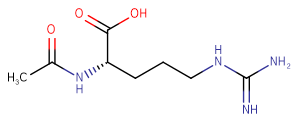
Ac-Arg-OH
CAS No. 155-84-0
Ac-Arg-OH( —— )
Catalog No. M21398 CAS No. 155-84-0
N-a-Acetyl-L-arginine also known as N-ac-L-arg-OH or N-alpha-acetylarginine belongs to the class of organic compounds known as n-acyl-l-alpha-amino acids.
Purity : >98% (HPLC)
 COA
COA
 Datasheet
Datasheet
 HNMR
HNMR
 HPLC
HPLC
 MSDS
MSDS
 Handing Instructions
Handing Instructions
| Size | Price / USD | Stock | Quantity |
| 100MG | 37 | Get Quote |


|
| 200MG | 52 | Get Quote |


|
| 500MG | Get Quote | Get Quote |


|
| 1G | Get Quote | Get Quote |


|
Biological Information
-
Product NameAc-Arg-OH
-
NoteResearch use only, not for human use.
-
Brief DescriptionN-a-Acetyl-L-arginine also known as N-ac-L-arg-OH or N-alpha-acetylarginine belongs to the class of organic compounds known as n-acyl-l-alpha-amino acids.
-
DescriptionN-a-Acetyl-L-arginine also known as N-ac-L-arg-OH or N-alpha-acetylarginine belongs to the class of organic compounds known as n-acyl-l-alpha-amino acids. These are n-acylated alpha amino acids which have the L-configuration of the alpha-carbon atom. N-a-Acetyl-L-arginine serum levels (and other guanidino compounds) were elevated of all the hyperargininemic patients are higher than the normal range. N-a-Acetyl-L-arginine is a very strong basic compound (based on its pKa). Untreated hyperargininemic patients have the highest guanidino compound levels in cerebrospinal fluid. N-a-Acetyl-L-arginine is one of the guanidino compounds found elevated in the serum of an hemodialyzed renal insufficient (uremic) pediatric population. Outside of the human body N-a-Acetyl-L-arginine has been detected but not quantified in apples and loquats. This could make N-a-acetyl-L-arginine a potential biomarker for the consumption of these foods. N-a-Acetyl-L-arginine with regard to humans has been found to be associated with several diseases such as uremia and colorectal cancer; N-a-acetyl-L-arginine has also been linked to the inborn metabolic disorder hyperargininemia. During a low-arginine diet together with sodium benzoate therapy there was a marked decrease in plasma N-alpha-acetylarginine. N-a-Acetyl-L-arginine increases in urine hyperargininemic patients.
-
In Vitro——
-
In Vivo——
-
Synonyms——
-
PathwayProteasome/Ubiquitin
-
TargetEndogenous Metabolite
-
RecptorHuman Endogenous Metabolite
-
Research Area——
-
Indication——
Chemical Information
-
CAS Number155-84-0
-
Formula Weight216.24
-
Molecular FormulaC8H16N4O3
-
Purity>98% (HPLC)
-
SolubilityDMSO:43 mg/mL (198.85 mM)
-
SMILESCC(N[C@@H](CCCNC(N)=N)C(O)=O)=O
-
Chemical Name——
Shipping & Storage Information
-
Storage(-20℃)
-
ShippingWith Ice Pack
-
Stability≥ 2 years
Reference
1.De Deyn PP et al. Serum guanidino compound levels in uremic pediatric patients treated with hemodialysis or continuous cycle peritoneal dialysis. Correlations between nerve conduction velocities and altered guanidino compound concentrations. Nephron. 1995;69(4):411-7.
molnova catalog



related products
-
Dimethyl sulfone
Dimethyl sulfone exists in all living organisms, ranging from bacteria to humans.
-
1-Methyl-L-histidine
Natural but non-proteinogenic amino acid; employed as index of muscle protein breakdown.
-
trans-Aconitic acid
Trans-Aconitic acid is normally present in normal human urine and it has been suggested that is present in larger amounts with Reye's syndrome and organic aciduria. trans-Aconitic acid is a substrate of enzyme trans-aconitate 2-methyltransferase (EC 2.1.1.144).



 Cart
Cart
 sales@molnova.com
sales@molnova.com


